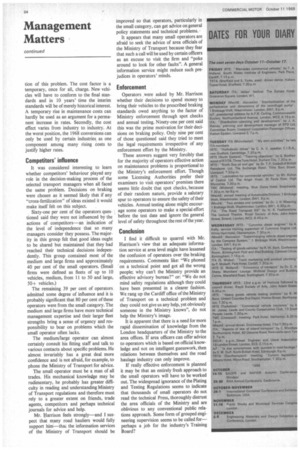Management Matters
Page 66

If you've noticed an error in this article please click here to report it so we can fix it.
lion of this problem. The cost factor is a temporary, once for all, charge. New vehicles will have to conform to the final standards and in 10 years' time the interim standards will be of merely historical interest. A temporary rise in maintenance costs can hardly be used as an argument for a permanent increase in rates. Secondly, the cost effect varies from industry to industry. At the worst position, the 1968 conversions can only be used by certain industries as one component among many rising costs to justify higher rates.
Competitors' influence It was considered interesting to learn whether competitors' behaviour played any role in the decision-making process of the selected transport managers when all faced the same problem. Decisions on braking were chosen as it seemed likely that if any "cross-fertilization" of ideas existed it would make itself felt on this subject.
Sixty-one per cent of the operators questioned said they were not influenced by the actions of competitors—an indication of the level of independence that so many managers consider they possess. The majority in this group felt that good ideas ought to be shared but maintained that they had reached their technical decisions independently. This group contained most of the medium and large firms and approximately 40 per cent of the small operators. (Small firms were defined as fleets of up to 10 vehicles, medium, from 11 to 50 and large, 50+ vehicles.) The remaining 39 per cent of operators admitted some degree of influence and it is probably significant that 80 per cent of these operators were from the small category. The medium and large firms have more technical management expertise and their larger fleet strengths bring a sense of urgency and responsibility to bear on problems which the small operator often lacks.
The medium/large operator can almost certainly consult his fitting staff and talk to various contacts about specific problems. He almost invariably has a great deal more confidence and is not afraid, for example, to phone the Ministry of Transport for advice.
The small operator must be a man of all trades. His mechanical knowledge may be rudimentary, he probably has greater difficulty in reading and understanding Ministry of Transport regulations and therefore must rely to a greater extent on friends, trade agents, competitors and perhaps technical journals for advice and help.
Mr. Harrison feels strongly—and I suspect that many road hauliers would fully support hirti—thai, the information services of the Ministry of Transport should be improved so that operators, particularly in the small category, can get advice on general policy statements and technical problems.'
It appears that many small operators are afraid to seek the advice of area officials of the Ministry of Transport because they fear that such a call will be used by certain officers as an excuse to visit the firm and "poke around to look for other faults". A general information service might reduce such prejudices in operators' minds.
Enforcement Operators were asked by Mr. Harrison whether their decisions to spend money to bring their vehicles to the prescribed braking standards owed anything to the factor of Ministry enforcement through spot checks and annual testing. Ninety-one per cent said this was the prime motivation for their decisions on braking policy. Only nine per cent of those questioned said they tried to meet the legal requirements irrespective of any enforcement effort by the Ministry.
These answers suggest very forcibly that for the majority of operators effective action on maintenance problems is proportional to the Ministry's enforcement effort. Though some "Licensing Authorities prefer their examiners to visit operators' premises there seems little doubt that spot checks, because of their random nature, provide a salutary spur to operators to ensure the safety of their vehicles. Annual testing alone might encourage some operators to make a special effort before the test date and ignore the general level of safety throughout the rest of the year.
Conclusion I find it difficult to quarrel with Mr. Harrison's view that an adequate information service at area level might have lessened the confusion of operators over the braking requirements. Comments like: "We phoned on a technical point and got all the wrong people; why can't the Ministry provide an effective advisory bureau?" or: "We do not mind safety regulations although they could have been presented in a clearer fashion. We rang up the Cardiff office of the Ministry of Transport on a technical problem and they could not give us any help, yet obviously someone in the Ministry knows", do not help the Ministry's image.
It is apparent that there is a need for more rapid dissemination of knowledge from the London headquarters of the Ministry to the area offices. If area officers can offer advice to operators which is based on official knowledge and not on intelligent guesswork, then relations between themselves and the road haulage industry can only improve.
If really effective enforcement is planned it may be that an entirely fresh approach to the small operators will have to be worked out. The widespread ignorance of the Plating and Testing Regulations seems to indicate that thousands of small operators do not read the technical Press, thoroughly distrust the area officials of the Ministry and are oblivious to any conventional public relations approach. Some form of grouped engineering supervision seems to be called for— perhaps a job for the industry's Training Board?












































































































